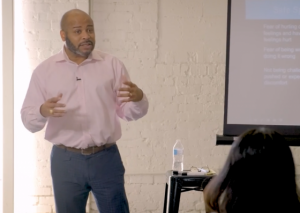

Why Partner with the National Center for Civil and Human Rights for Culture Connection Workshops?
Culture Connections believes in the ideal of “out of many, one.”
The phrase e pluribus unum — “out of many, one” — has been America’s motto since 1776 and appears on the nation’s Great Seal. Originally representing the union of 13 colonies into a single nation, this ideal reflects the strength gained when a range of people work for a collective purpose.
This principle is just as vital in workplaces today. When organizations embrace a wealth of talents and perspectives, they foster innovation, collaboration, and success.
The Center’s Culture Connections program engages participants with discussions across various topics that encourage teamwork and help organizations more effectively work toward common organizational goals.
The Center’s facilitations encourage change and growth, exploring issues of individuality, opportunity, and community to create workplace environments that can improve the way businesses operate. We offer a “brave space” experience that allows participants to move past discomfort, encouraging experiences and dialogue that transform workplace culture.
As a history museum, The Center is able to connect the civil and global human rights movements to challenges today, drawing on that knowledge to improve a sense of workplace belonging.
We empower organizations to cultivate positive cultures where every employee feels valued, engaged, and motivated to contribute their talents and perspectives. By prioritizing organizational culture, we help organizations create workplace environments that enhance performance and drive success.
Research shows that when workplace cultural challenges are left unaddressed, morale declines, employee retention suffers, and recruitment becomes more difficult. McKinsey Group’s 2020 study found that companies that employ individuals with a wide variety of backgrounds and experiences are more likely to outperform more uniform organizations in profitability. Investing in organizational culture training fosters creativity, drives innovation, and strengthens market performance.
The Right Time for Organizational Culture Training
Your organization will benefit if you answer NO to any of these questions:
 Our program is built on three key pillars designed to set your organization up for success.
Our program is built on three key pillars designed to set your organization up for success.
+Experience: The National Center for Civil and Human Rights connects history from the civil and global human rights movements to challenges today, drawing on those lessons to improve workplace culture. We use discussion and prompts to engage teams in active conversation.
+A Brave Space: Talking about workplace issues can be challenging, even when we recognize the benefit of open communication. We offer a “brave space” – encouraging curiosity and grace to generate honest, transparent dialogue that helps participants move past discomfort.
+Flexibility: Our Culture Connections experiences are customized for each organization we work with – companies, nonprofits and educational institutions. We offer our conversations in three formats: onsite at The Center in downtown Atlanta (when available), at a physical location of your choosing, or virtually.
DESIGNING YOUR Culture Connections EXPERIENCE
Putting Organizational Values into Action
Using an organization’s values, we explore how they manifest in the institution’s culture.
Creating a Common Language for Organizational Culture
Are we aligned in our understanding when we discuss creating experiences that resonate with everyone in the organization, fostering a true sense of fellowship and membership.
Understanding Subconscious Assumptions and Subtle Insults
An exploration of assumptions, how they manifest as insults, and how those insults can unintentionally fracture the positive culture of an organization. More importantly, we learn how we can identify and address these issues.
Embracing Cross Generational Differences
Explore generational points of view and how age, and several other identities, intersect.
Cultivating Collaborative Behaviors
An exploration of emotional intelligence and the role it plays in creating collaborative cultures and the foundational behaviors leaders should model to create these cultures.
Applying the Lessons of History to the Workplace
Explore the impact of historical events on the current structure and culture in many organizations today. Provide tools for employees to create environments of understanding and open opportunities for all employees.
Empowering Allyship
Explores the partnership between allies and members of under-represented groups and how ally support of these groups can contribute to organizational success.
LGBTQ+ belonging in the Workplace
Definitions and practical applications for a collaborative workplace.
BRG/ERG Leaders Advocating for Workplace Fairness
Addresses how BRG/ERG leaders can build alliances in relationships across differences and advocate for underrepresented groups .
Empathy-Building through History
Senior managers explore different perspectives in the decision-making processes in the historic Montgomery Bus Boycott and apply them to current issues in Organizational Culture.
The Business Case for Creating a Positive Organizational Culture
Advancing Organizational Culture is an ethical imperative, but it’s also a business imperative and should be at the core of a company’s business strategy. This discussion highlights the advantages seen for organizations that focus on culture improvements as compared to those that do not focus on cultural improvements.
Using Feedback as a Tool for Workplace Fairness
High-quality feedback is crucial for individual advancement and organizational growth. Talent thrives where people give and receive honest feedback.
Gender and the Workplace
Expectations for single mothers, male caregivers, female leadership; understanding how issues of gender stereotypes play out in the workplace.
Significance of Acceptance
From productivity to retention, fostering universal acceptance increases healthy connections, and increases well-being.
Cultivating Psychological Safety
Explore its role in creating accepting organizations, increasing collaboration, innovation, trust, and accountability.
Defining Identity and Navigating Power
Explore individual and social identity, the relationship to power, and how leaders can use their power to advance organizational culture.
Navigating Challenging Conversations
In table-top, scenario-based activities, leaders learn techniques for empathetic listening, humility, giving supportive feedback, and asking effective questions.
Creating a Meeting with Organizational Culture in Mind
Leaders are taught to use effective practices to conduct productive meetings that leverage the contributions and thoughts of all members of the team through proper planning of agendas, facilitation, and follow up activities.
We have created several Learning Series to provide a roadmap to support your ongoing needs and unique roles within your organization. Each “series” is made up of 4-8 modules such as Cultivating Psychological Safety, Using Feedback as a Tool for Equal Opportunity, The Business Case for Advocating for Organizational Culture, Navigating Challenging Conversation, and Characteristics of Inclusive Leaders. These modules will be delivered either monthly or quarterly, providing a roadmap to support your ongoing needs.
Leadership Series
+ Cultivating Psychological Safety
+ Using Feedback as a Tool for Workplace Fairness
+ The Business Case for Creating a Positive Organizational Culture
+ Defining Identity and Navigating Power
+ Navigating Challenging Conversations
BRG/ERG Leaders Series
+ BRG/ERG Leaders Advocating for Workplace Fairness
+ Cultivating Psychological Safety
+ Navigating Challenging Conversations
+ Empowering Allyship
+ Defining Identity and Navigating Power
General Audiences Series
+ Putting Organizational Values into Action
+ Creating a Common Language for Organizational Culture Concepts
+ Understanding Subconscious Assumptions and Subtle Insults
+ Embracing Cross Generational Differences
+ Empowering Allyship
+ Navigating Challenging Conversations
Onboarding/New Employee Series
+ Creating a Common Language for Organizational Culture
+ Understanding Subconscious Assumptions and Subtle Insults
+ Embracing Cross Generational Differences
+ Empowering Allyship
LGBTQ+ Series
+ Understanding Subconscious Assumptions and Subtle Insults
+ LGBTQ+ belonging in the Workplace
+ Gender and the Workplace
HR Leaders Series
+ Cultivating Psychological Safety
+ Creating a Meeting with Organizational Culture in Mind
+ Using Feedback as a Tool for Workplace Fairness
+ Defining Identity and Navigating Power
The Center would like to thank our sponsor(s) for their support of our mission driving initiatives. If you are interested in sponsoring The Center’s Culture Connections program, please contact Phil Polk at [email protected].
UPS is a proud supporter of the National Center for Civil and Human Rights.

Contact us to discuss how we can build an experience to support your organizational culture needs. Contact Pam Seiler at: [email protected], 720-581-1436